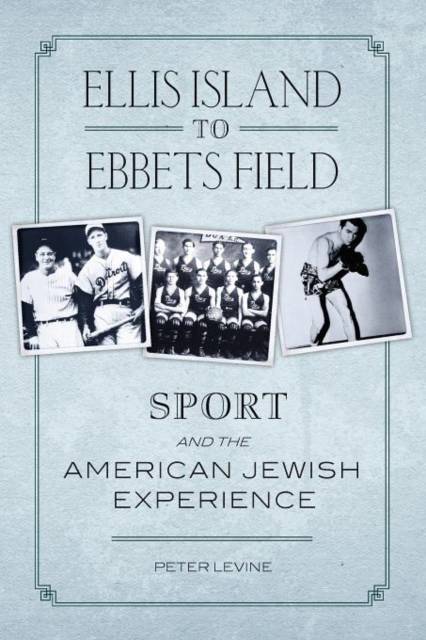
- Afhalen na 1 uur in een winkel met voorraad
- Gratis thuislevering in België vanaf € 30
- Ruim aanbod met 7 miljoen producten
- Afhalen na 1 uur in een winkel met voorraad
- Gratis thuislevering in België vanaf € 30
- Ruim aanbod met 7 miljoen producten
Zoeken
Ellis Island to Ebbets Field
Sport and the American Jewish Experience
Peter Levine
Paperback | Engels
€ 56,45
+ 112 punten
Omschrijving
Jews have stereotypically been considered people of the book rather than people of the jump shot, right cross, or home run. Yet for many East European Jewish immigrants, and especially their children, participation in American sport during the first half of the twentieth century became an important part of their pursuit of the American dream and a pathway to assimilation. In Ellis Island to Ebbets Field, Peter Levine explores the importance of sport in transforming Jewish immigrants into American Jews. Drawing on interviews with celebrities as well as lesser known neighborhood stars, Levine vividly recounts the stories of Red Auerbach, Hank Greenberg, Moe Berg, Sid Luckman, Andy Cohen, Nat Holman, Benny Leonard, Barney Ross, Marty Glickman, Jammy Moskowitz and many others who became Jewish heroes and symbols of the difficult struggle for American success. From settlement houses and street corners, to Madison Square Garden and Fenway Park, their experiences illuminate a time when Jewish males dominated sports like boxing and basketball, helping to smash stereotypes about Jewish weakness while instilling American Jews with a fierce pride in their strength and ability in the face of Nazi aggression, domestic anti-Semitism, and economic depression. And Levine brings the story up to date with sure comparisons to the experiences of more contemporary Jewish athletes such as Sandy Koufax, "Super Jew" Mike Epstein, Mark Spitz, and Amy Alcott. Be it the story of Jesse Owens's Olympic triumph at the expense of Marty Glickman, the baseball heroics of Hank Greenberg and his status as preeminent Jewish hero, the incredible exploits of championship basketball teams like the Philadelphia SPHAs, thenimble football feet of the "Jewish hillbilly, " Marshall Goldberg, or the pummeling fists of "Battling" Levinsky, Ellis Island to Ebbets Field reveals a community full of conflict and hope, where sport--both watching it and playing it--served as a middle ground between minority and
Specificaties
Betrokkenen
- Auteur(s):
- Uitgeverij:
Inhoud
- Aantal bladzijden:
- 352
- Taal:
- Engels
Eigenschappen
- Productcode (EAN):
- 9780195085556
- Verschijningsdatum:
- 9/09/1993
- Uitvoering:
- Paperback
- Formaat:
- Trade paperback (VS)
- Afmetingen:
- 155 mm x 234 mm
- Gewicht:
- 512 g

Alleen bij Standaard Boekhandel
+ 112 punten op je klantenkaart van Standaard Boekhandel
Beoordelingen
We publiceren alleen reviews die voldoen aan de voorwaarden voor reviews. Bekijk onze voorwaarden voor reviews.







